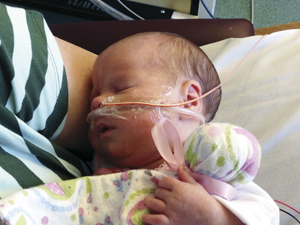By JULIE MINDA
Newborns, including the sick babies in neonatal intensive care units, are soothed by the voices of their parents and the smell of their mothers. But, by necessity, parents of NICU babies must leave the hospital at times, and that separation can add to parental anxiety.

Jaycee Davis cradles a lovey doll while she naps in her mother's arms in the neonatal intensive care unit at Providence St. Vincent Medical Center in Portland, Ore.
Leaving behind a "lovey doll" can ease parents' minds a bit and provide some comfort to their babies, according to staff at Providence St. Vincent Medical Center in Portland, Ore. The lovey dolls are simple flannel dolls that a mother holds against her skin to transfer scent. The doll is placed near the baby's head. "When I left at night, to know (my twins) had those lovey dolls with them and could smell me overnight as they slept — for me it made all the difference in the world," said Krista Davis, whose daughters Jaycee and Reagan were born June 13, two and a half months prematurely, at Providence St. Vincent.
Providence St. Vincent neonatal nurse practitioner Melissa Friant had started the lovey dolls program the month before the twins' birth. Friant had come from a hospital that had a similar program. She said the concept is grounded in research on the importance of the sense of smell for bonding and feeding. Friant said smell is one of the first senses to develop in the womb. Studies show that exposure to a mother's scent and the scent of her breast milk calms newborns, improves their respiratory functions, decreases any pain and stimulates sucking.
Friant said that especially for preemies, "Feeding is a big task, and the smells can stimulate the brain" to respond to feeding cues.
"And smells are connected with emotion and memory in the brain," Friant said, which helps the babies developmentally.
Providence St. Vincent nurses offer the dolls to every family in the NICU. They've given out about 450 so far.
Volunteers sew the dolls; and then Friant takes them home and washes them in hot water with unscented, hypoallergenic detergent. When giving the doll to parents, nurses explain that the dolls can be placed near their infant's face while the babies are being monitored in the hospital. But, because of the risk of suffocation, once the babies go home, neither the dolls nor any loose item should be left in a crib with an unsupervised baby.
Friant said parents have told her that the lovey dolls are "mentally helpful. It feels like a part of them is still there" when they have to leave. "It helps them feel they're not just leaving their baby behind, because that can be so traumatic" for parents.
The Davis twins were in the NICU for 56 days. Because Davis herself was recovering from complications of the pregnancy and birth, she had to go home periodically. "It made it easier for me to go home and rest knowing (the babies) felt a part of me was still there with them."
Davis' husband was relocating from Oregon to Louisiana when the girls were born (the family is reunited in Louisiana now); and he only was able to be with his daughters a total of 14 of the days they were in the hospital.
He used lovey dolls as well, so the babies would have them during his long absences. When the babies were discharged home, Davis put one of her husband's shirts under the crib sheet, so his scent could reach the babies. "I didn't want him to be a stranger to them," she said.
"The dolls were very valuable to us," Davis said. "They were important for the bonding process."
Copyright © 2014 by the Catholic Health Association
of the United States
For reprint permission, contact Betty Crosby
or call (314) 253-3477.